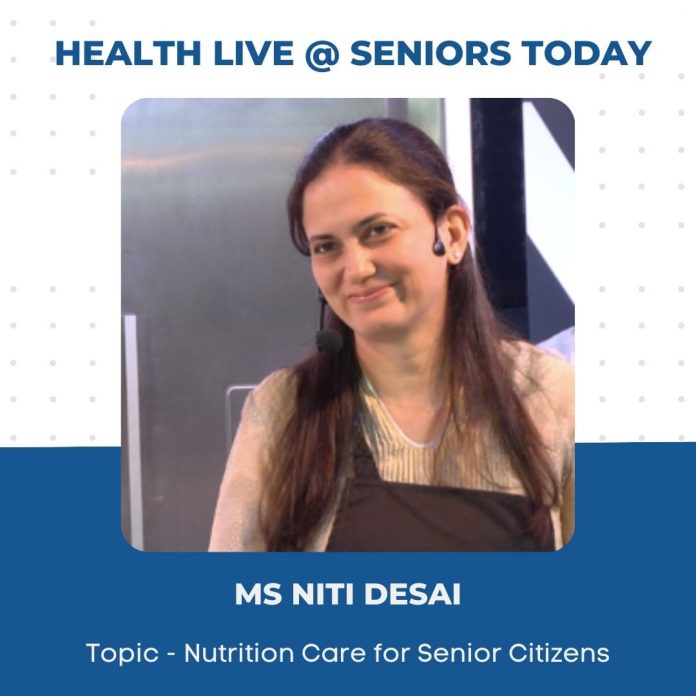On October 23, 2021, Health Live @ Seniors Today hosted leading nutritionist Neeti Desai who spoke and answered questions about nutrition care in senior citizens. Dr Noor Gill captures the takeaways from the session
Desai is a Consultant Nutritionist attached to the Cumballa Hill Hospital, Mumbai for 17 years. She is Secretary and Master Trainer, Association of Diabetes Educators and Co-editor of IDA’s Clinical Dietetic Manual, 2018. She has authored chapters for various textbooks. Ms Desai is Joint Treasurer: IDA – Mumbai Chapter. She has been writing a column in Health & Nutrition magazine for 18 years and was Official Nutritionist at the Femina Miss India pageant in 2008.
- You can live a long life, but the quality of that life is also what matters.
- All the lifestyle diseases are in one way or the other connected to your nutrition.
- One of the most commonly asked questions is “what is my ideal weight?” so in a layman’s language, for males, if you know your height in cms – 100; for women it is, height in cms – 105. This gives you a rough estimate as to what your ideal weight should be.
- Another way to find your ideal weight is to tie a measuring tape around your waist and see the measurement. For men, it should be less than 90cms and for women, less than 80cms.
- The Indian guidelines for being overweight or obese have been revised; they want us to be much leaner now than before because of the impending epidemic of diabetes and heart disease that we need to be cautious about in our country.
- You can blame 35% of your weight on your genes, your co-morbidities, but our lifestyle and daily eating habits matter a lot
- With every passing decade of your life, there is a 10% drop in the metabolic rate which means that our body needs much less calorific requirement to sustain it, but if you continue to consume just as much as you did at 30, when you’re 60, you’re sure to put on weight. This weight can come in an apple shape or a pear shape. The apple shape is more common in men where the fat deposition is around the abdomen; the good news is that this fat is easy to lose but the bad news is that this is the dangerous fat. This fat is related to diabetes, blood pressure, high cholesterol levels. While in the case of women, the pear shape distribution of fat where the fat is more on the hips and thighs is not so medically dangerous but the bad news is that this fat is stubborn to go.
- Some ways to keep your metabolic rates high:
^ Do not skip meals
^ Make sure you sleep well at night and maintain a good sleep rhythm
^ Drink sufficient water
^ Exercise frequently and consistently.
The question “how to lose weight?” though is made to be something only rocket scientists can answer, where in fact the answer is very simple: you need to take/ consume less calories and increase the output, create a negative balance and the weight loss can be achieved.
- An extensive weight loss programme should have a combination of diet and exercise and not just one or the other, or either of them alone.
- A sensible way to lose weight is to lose no more than 1-1.5 kg of weight per and not any more than that. But with seniors, the weight drop limit falls even lower, 0.5 kg per week which comes down to two kilos per month.
- Crash diets are harmful for you. They will of course lead to quick weight loss and results but there will also be consequent weight gain and the subsequent weight loss will be rather difficult. This will also add to and sometimes cause hair loss, low blood pressure, weakness, fatigue. This leads to muscle weakness and muscle wasting. Do not be in a hurry to lose weight, and when you do lose weight, make sure you’re doing it the right way. Do not skip means or eliminate certain food groups. Consult a professional and then make a decision. It is better to be slightly overweight but consistent with your weight than going up and down frequently.
- Eat breakfast like a king, lunch like a prince and dinner like a pauper.
- We also need to reduce our intake of fat which includes oil, butter, ghee, bakery products, fried foods, aerated drinks and ‘sharbats’.
- The use of coconut and groundnut in cooking needs to come down.
- Sugar even when replaced with jiggery or gur, gives the same amount of calories so avoid these if you’re trying to lose weight.
- The Indian society being a predominantly vegetarian one does not meet its daily protein intake. Our daily protein requirement is 1 gm/kg body weight.
- Half of your plate should be filled with vegetables and pulses, one forth should be your rice and chapatti and a little less than one fourth should be protein.
- Do not drink your calories, eat them. It is better to have fruits than having fruit juice.








